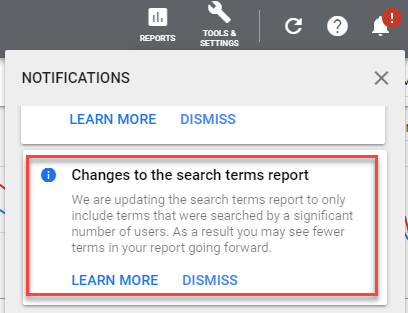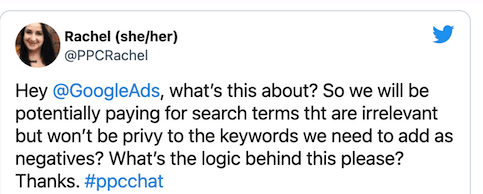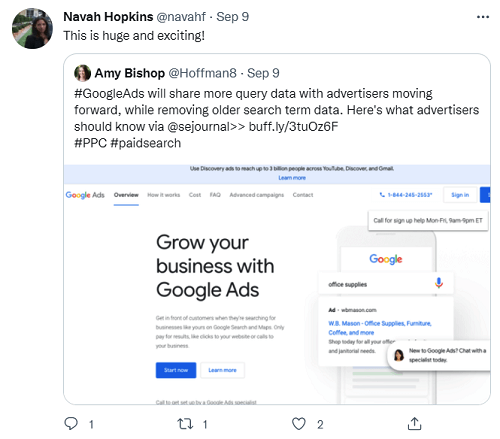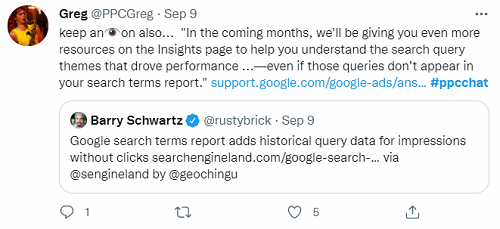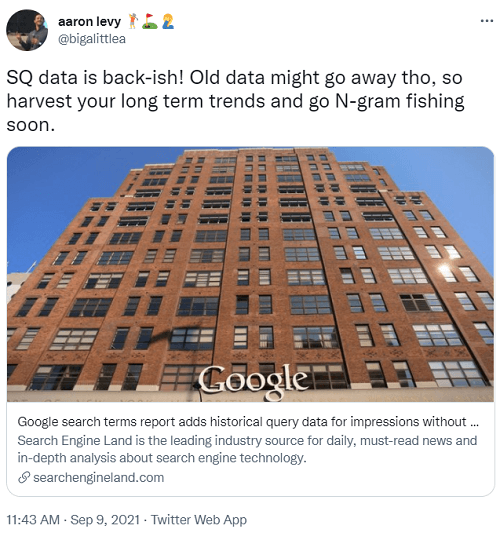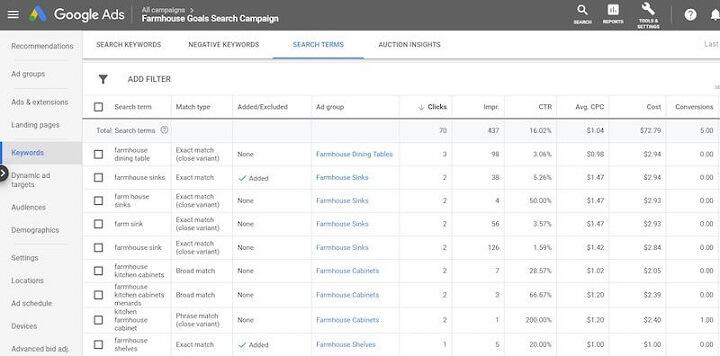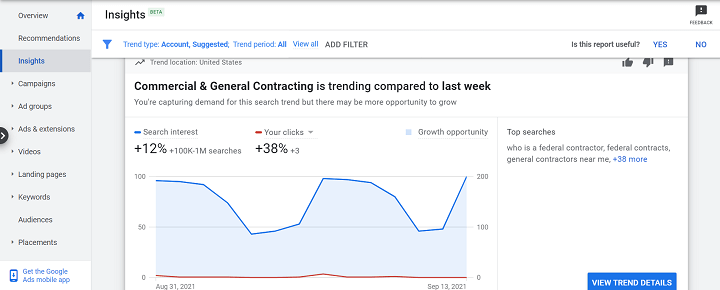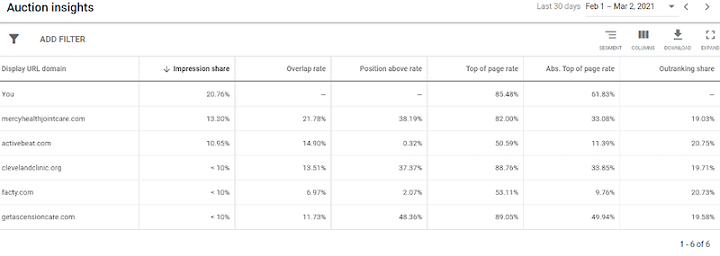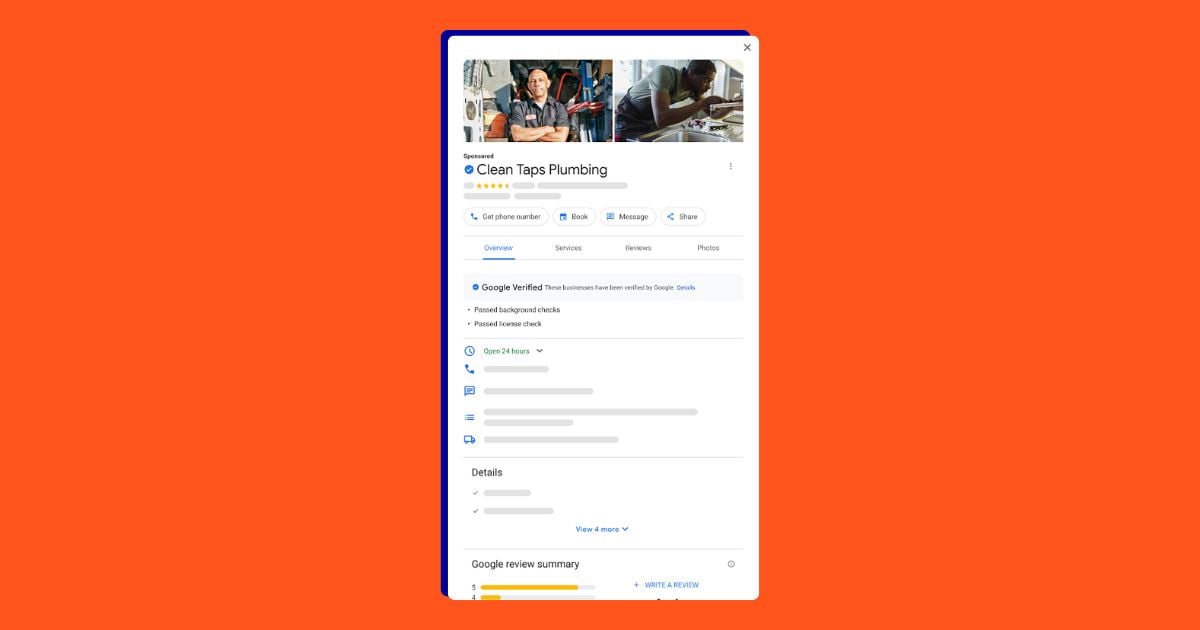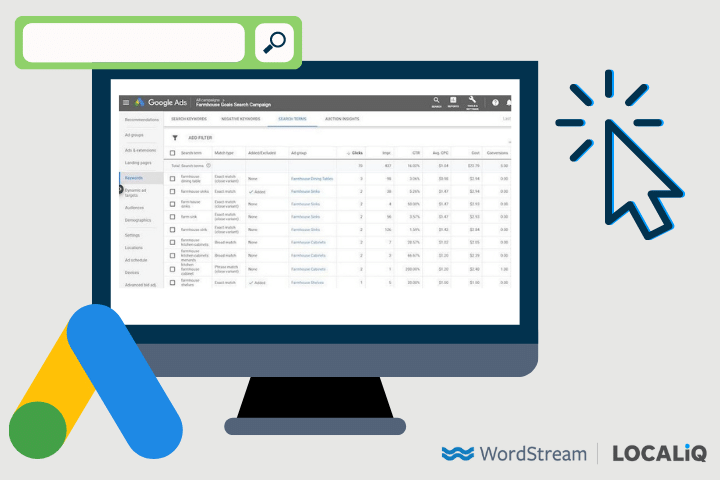
Maybe I nerd out over PPC too much, but I think looking through the search terms report is the most entertaining activity. When else do you have the opportunity to get inside the heads of your audience and see what they’re typing into Google?
Last year, Google took away some of the fun with limitations they placed on the data. I was among many advertisers bummed out about it. But just last week on September 9, Google announced it would be adding some new data to the search terms report.
So what are these changes? Are they all positive? Read on to find out:
- What’s improving in the Google Ads search terms report.
- What the trade-off is.
- Comments from the PPC community on what this change means.
- Four tips on how to make the most of the data you have.
Google adds new data to the search terms report—an improvement?
On September 9, Google announced that it will be making improvements to the search terms report tool within the advertising platform. Google stated that, effective immediately, search terms that pulled in impressions but no clicks will now show. So you may already be seeing this in your account!
This is different from it previously only showing popular queries that pulled in clicks. While you’ll still only be able to see the highest volume terms that meet privacy thresholds, this at least gives advertisers a bit more to work with.
They also did us the favor of having this change apply to some of our historical data as well. The new search terms reporting will be applicable to all data going back to February 1, 2021.
So, if you want to get a better idea of what you’ve been showing up for this past year, that’s now possible.
For further context…
The Google Ads search terms report used to show us all the queries our ads showed for. It gets me fondly nostalgic just thinking back on that.
But in September 2020, Google Ads reduced the visibility in the search terms report to only show queries that “a significant number of users searched for” to maintain privacy between searcher and advertiser.
Many advertisers were unhappy about these limitations, pleading with Google to give us the data we have a right to.
One of many angry tweets in response to Google’s 2020 announcement.
So this is what Google means in its 2021 update when it says “We’ve heard your feedback on last year’s search terms report updates.” We still can’t see low-volume queries, but for now, this recently released update is the closest we’ve gotten to an improvement.
But Google is also removing some data in 2022
I can’t believe I thought Google would let us off this easy! Of course, there’s a catch with this change.
Although Google is expanding the search terms report to include high volume search queries with impressions but no clicks, there is a give-take here.
In February 2022, Google will be removing search terms in historical reports that don’t meet the privacy threshold volume established in September 2020.
What this means is, right now, if you look at your search terms report data for any date range prior to September 2020, you will still be able to see low-volume search terms.
But in February 2022, this will no longer be possible. All search term data, pre- and post-September 2020, will have the same limitations—showing only search terms with high enough volume to protect privacy.
However, this was some time ago. With the ever-changing search space, looking back on old search terms you showed for years ago may not do you much good anyway.
Thoughts from the PPC community on the search terms report update
I’m not the only who has an opinion on this change, check out what other PPC thought leaders are saying about this particular Google update:
General sentiment: this is good news
PPC Expert Navah Hopkins mentions the importance of this announcement to advertisers—and that we should get pumped about it.
Removal of old search term data is a bummer, but not a major loss
Search Engine Land sat down with senior product manager at Google, Pallavi Naresh, who stated that this shouldn’t be a major loss:
“‘Most advertisers will continue to see most of their queries prior to Sept 1, 2020…We are only removing historical queries that did not meet the new thresholds for search query reporting that we established in September 2020. We are removing this data as part of our ongoing effort to make our privacy thresholds consistent across Google.’”
This doesn’t assure us that our pre-September 2020 search terms report data will still be helpful—after all, seeing “most of” your queries may not necessarily be what you need if the ones not included in the report are the ones you are adding to your negative keywords list.
However, as I stated earlier, old search terms from a year ago or longer may not be useful information. So all in all, it doesn’t seem to be a major loss.
More Google updates are coming down the line
Greg Finn, another PPC thought leader, reminds us about the part in Google’s announcement regarding more updates to come.
Tips for the new search terms report changes
This may not be the break-through search terms update everyone was hoping for, but it’s a change nonetheless. Here are a few ways to take this update in stride:
1. Take inventory of old searches
Since we’re potentially losing past searches from before September 2020 (depending on the privacy thresholds) you may want to take a sweep through for anything notable. You can take inventory of any past search terms you may want to use as keywords, negatives, or ad copy ideas for future.
Similarly, now that we have access to more searches from February 2021 to now, take a look through your past searches from this year and see if anything new catches your eye.
Aaron Levy, head of paid search at Tinuiti, has the same idea, telling advertisers to “harvest your long term trends.”
2. Start looking through your current searches more regularly
Remember, we now have the ability to see a bit more into our current search terms! The practice of making regular check ups on the search terms report may have been abandoned by some folks due to the previous September 2020 changes. If this sounds like you, try incorporating a search terms review back into your regular PPC audit routine.
Searches with impressions but no clicks can be just as telling because they indicate those users were not inclined to click on your ad. So think about improvements you could make to improve your CTR (improving your headlines or adding extensions, for example).
3. Be on the lookout for more info on the Insights page
At the very end of the announcement, Google slyly hinted at providing even more resources on its new beta tool, the Insights page.
The Insights page will be similar to the recommendation section where you can get help on overall performance, but it will also provide information on trends within your industry.
The platform mentioned that, in the coming months, the Insights page will be built out to include “search terms themes” to give you a better idea of the types of searches you’re showing up for.
Here’s the official quote from Google on this:
“Our goal is to provide you with a deeper understanding of how your customers find you on Search. In the coming months, we’ll be giving you even more resources on the Insights page to help you understand the search query themes that drove performance in your campaigns—even if those queries don’t appear in your search terms report.”
4. Use Auction Insights and Google Trends for extra help
Lastly, these changes to the search terms report aren’t super significant. I can anticipate some advertisers, myself included, still wanting more. While this may be the best we can get from the search terms report for now, you can piece together what your SERP looks like elsewhere.
Auction insights is a great place to start because, while it doesn’t indicate what searches triggered your competitors to show, you at least know who else was sharing the SERP with you. This is key to understanding the competition space in your industry.
Additionally, you can always rely on Google Trends to help you get a better feel of what search queries people are interested in over time and location.
Both can help you better understand your searchers’ experience on the SERP when used in conjunction with the search terms report.
Another day, another (hopefully helpful) change from Google?
When push comes to shove, this change should assist most advertisers in maintaining some control over what queries their ads show for.
Even with the trade-off of losing some historical searches from years past, this change is the closest thing to a positive or helpful one from Google Ads that we’ve seen in a while.
Either way, you can see that these changes won’t stop coming from Google. Therefore, it’s best to take them in stride and see how you can make every update work for your business.
So, what are you going to do to make this change work in your favor? Let us know in the comments!


